Sometimes when you retell a story with a gender-flip, it’s like telling it for the first time. That seems to be the case with the emotionally charged After the Wedding, based on the Academy Award-nominated Danish film by Suzanne Bier, Efter Brylluppet.
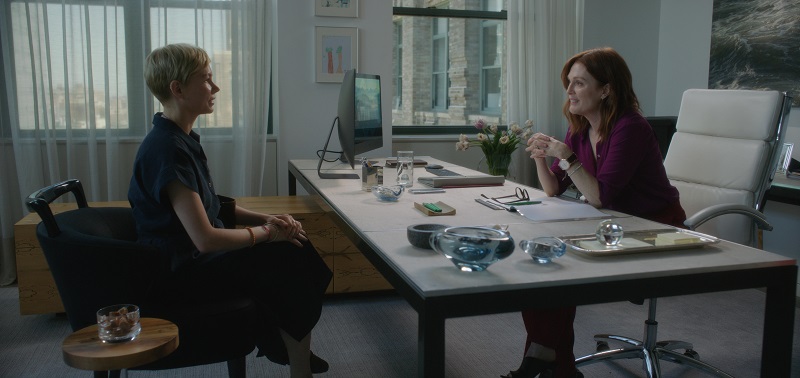
Reluctant to return to New York from an orphanage she manages in India, Isabella (Williams) meets with wealthy benefactor and media-mogul Theresa Young (Moore) out of sheer necessity. But Isabella quickly learns that there is more to Theresa’s offer than Isabella had originally thought, and that her generous donation comes with unforeseen caveats.
Yet, it’s Moore’s on-screen daughter, Abbey Quinn (Grace), that the narrative centers around. Quinn, who perfectly syncs into the storyline and brings the movie to life with a beautiful song, “Knew You for a Moment,” not only delivers a strong performance, but also wrote this incredible original song. This little number is sure to get some attention come awards season.
The cinematography is also noteworthy and makes the film look and feel more like a big-budget film than a lower-budget indie flick. Most of this can be attributed to veteran cinematographer Julio Macat, who is more known for big studio comedies, such as Home Alone and Wedding Crashers. Alas, it was Macat’s longtime industry connects that allowed him to shoot such a quality picture with limited resources, according to writer/director and Moore’s real-life husband, Bart Freundlich.
Moore, Freundlich and Quinn spoke to The Movie Mensch about the retelling of this remarkable story and how everything came together to make it a beautiful production.
Freundlich offered insight into the genesis of this project and what made him and Moore take on the ambitious task of remaking this film with a gender-swap. “Suzanne’s story was so touching and so complex emotionally that I didn’t see any reason to remake just as it was. Ya know, just put it in English and set it in New York,” he explained.
“It needed some kind of reinvention and when Julie saw the movie, she was really drawn to this one role.”
He continued,” I don’t think it was a real thought that we were actually going to change the genders, she was just expressing interest in this one role,” Freundlich added.
Oscar-winner Julianne Moore then chimed in to say that she was “riveted” by Rolf, the character in Bier’s film.
After he pitched the idea of the gender-swap to his fellow producers, they gave him the green light to go ahead and try it. Freundlich explained that one of his biggest challenges was navigating away from the original male scenario and figuring out to tell the same story from the female perspective.
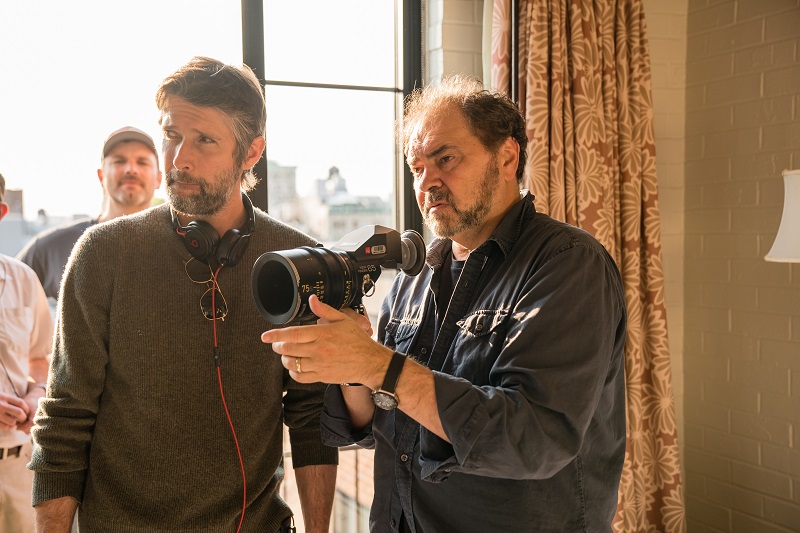
Nevertheless, this “ultimate stumbling block,” as he referred to it, helped him reinvent the whole project. “It kind of gave me this who new world to explore that wasn’t just based on Suzanne’s movie,” the director elucidated.
Freundlich went further to explain that it felt authentic to have two very strong women with conflicting life philosophies at the center of the story. “And then having Julie and Michelle play those roles, it was like Pacino and De Niro in Heat,” he joked.
“Oh, my god! They are both in this room and they are both going to be acting! It was really exciting,” Freundlich said laughing.
Moore also gave insight into what she really felt heightened the drama: The deliberate and consensual lies told by the adults throughout the film for one reason or another.
“That deliberateness really heightened the drama,” Moore insisted. “I also loved it because it’s very human. People often make the best decision at the time and later have to live with the consequences,” she added.
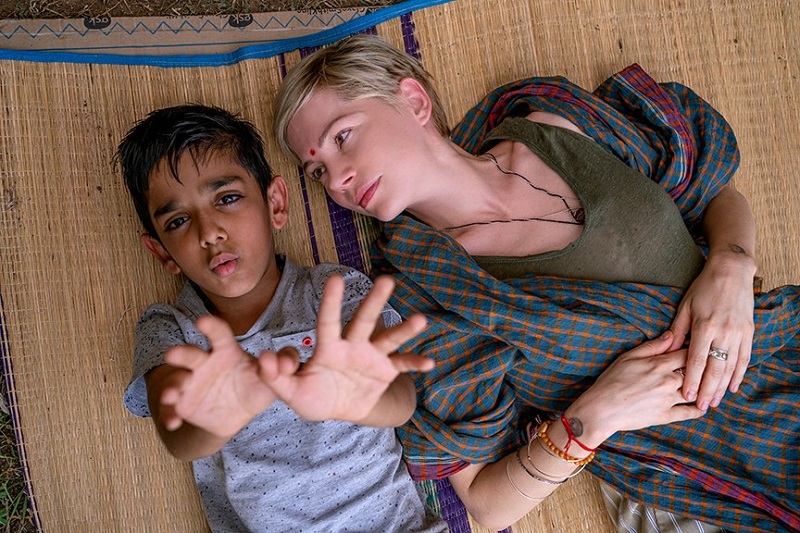
As far as preparation and inspiration to play such an emotionally-charged role, Moore said, “We have a friend, who has a company called “Horizon Media,” and we shot in his office, no joke.”
Moore went on to explain that she spent a great deal of time with him to get into character as far as “how to speak to people and how to delegate” in a position of power. She continued to explain that in her own personal experience, she has been surrounded by women with “big careers” who are also “dedicated” to their families and “what it takes to achieve that.”
“And it’s nice to see a woman in a powerful position, who is not represented as an evil boss lady, because that’s not been my experience,” the 58-year-old actor said. And for the more dramatic scenes, Moore said that she drank “a lot of water.”
“You have to be sure you’re drinking enough water when you have a big crying scene,” she exclaimed with laughs.
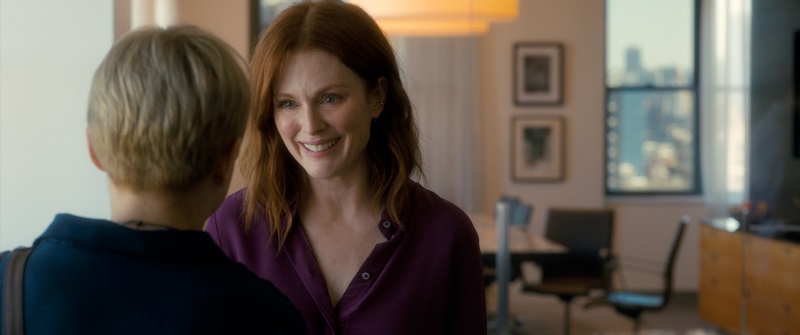
As far as collaborating with her husband, Freundlich, to produce this film, the two said the process was overall jovial and they had a significant amount of time to discuss the production since, after all, they do “live together.”
As far as disagreeing when comes to work, Freundlich said that he usually trusted his wife’s instincts throughout the process. Unless he was “100% certain” that he wanted to do anything a particular way, simply because he had more “back row view” since he was the director, he would typically trust Moore’s judgment. Especially, when it came to her character.
“That’s kind of how I view it with the actors if you hire them the right way,” he added.
Moore and Freundlich then threw some accolades over to the talented Abby Quinn, saying “she was absolutely perfect for this part.” “I remember when we looked at the recording of the wedding speech and Bart and I were just like, ‘Oh, my god! This is fantastic,’” Moore recounted.
The 23-year-old actor said she was “nervous” to be acting in front of her “idles,” but the “entire cast really put me at ease from the moment I met them.” Quinn went on to explain that Williams and Moore made it really easy for her and that she was “surprisingly comfortable while filming.” Quinn also said that they were able to read through the scenes a few times, “and that really just set a tone for the rest of the film.”
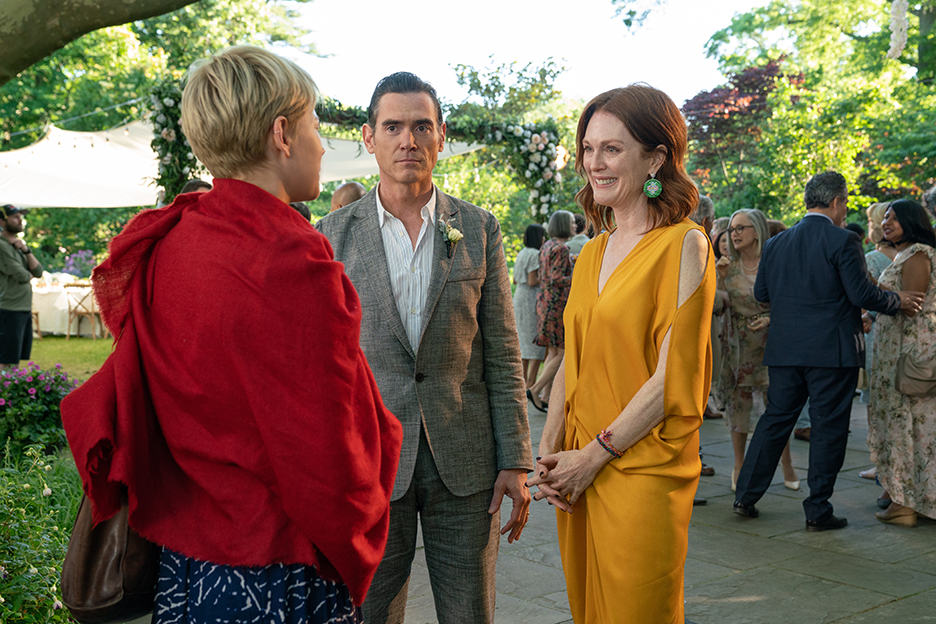
“I felt accepted,” Quinn added.” Which is kind of the most important thing in acting, because I felt like I could make mistakes and try again, and that really put me at ease.”
Luckily, in most of Quinn’s scenes, she plays a nervous character who has concerns about being truly ready to be married. So, any nervousness comes off as authentic and works.
Moore chimed in one last time to say that she loves one line in particular from the film: “I can tell her that she’s too young (to be married), and have her be mad at me forever. Or, I can give her a really beautiful wedding. And that’s what I’m gonna’ do.”
After the Wedding is out August 9 and this tear-jerker of a tale is not to be missed. Our review is coming soon …

